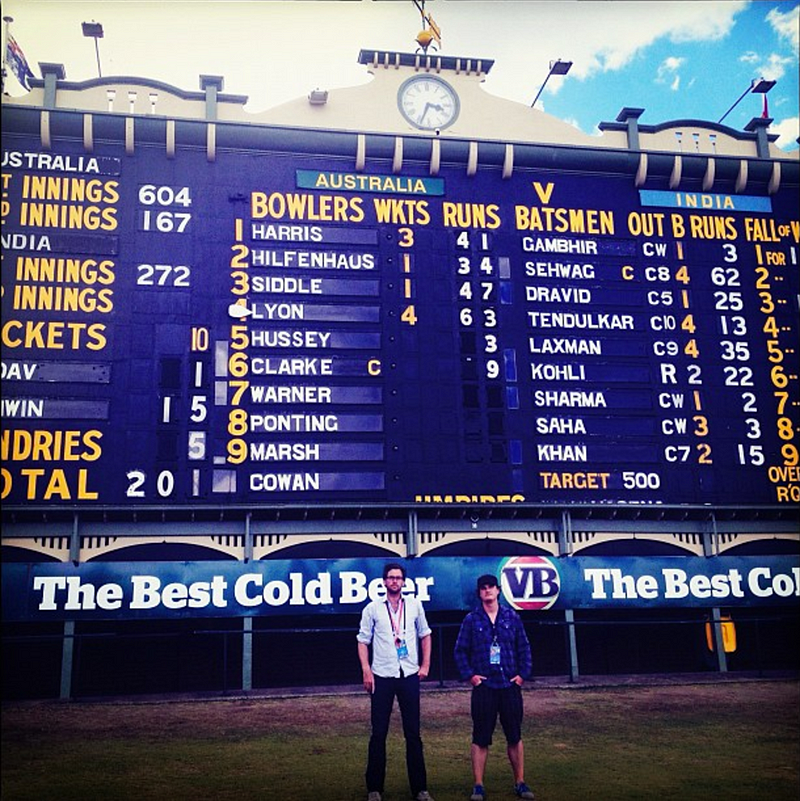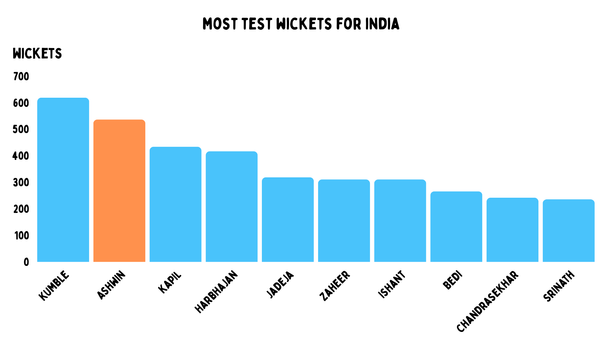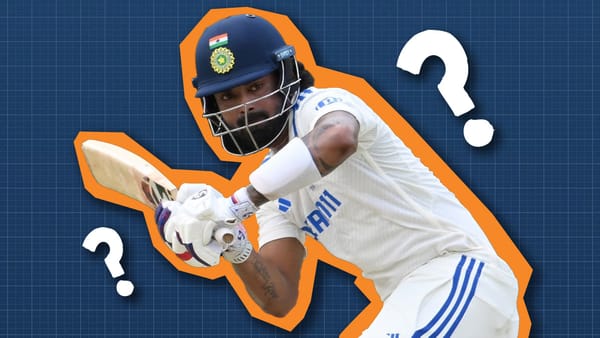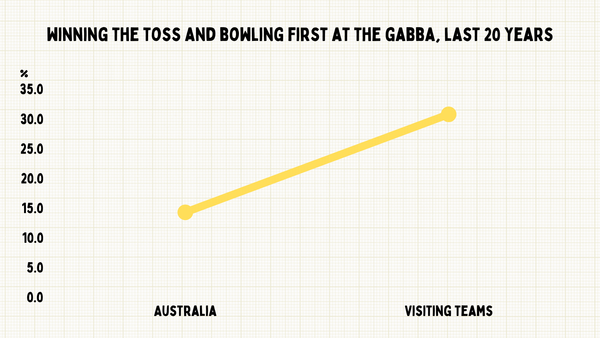Marcus North saves lives: One night in Adelaide that Cate McGregor remembers
I talked a lot about Marcus North’s five country sides the night Malcolm McGregor didn’t kill himself, and Cate McGregor was born. It was…

I talked a lot about Marcus North’s five country sides the night Malcolm McGregor didn’t kill himself, and Cate McGregor was born. It was Sam who told me about Cate when he said that Malcolm had written a book, and it talked about that night.
The first time I met Sam he was trying to make intellectual points about cricket writing while also eating an entire meal as quick as he could to make it to his football match. He was, is, much like Rusty Ryan, Ocean’s Eleven, good looking, able to solve any problem, and perpetually eating. We didn’t become friends straight away; we became friends at my wedding. It was a year later that we decided to partner up and make videos together. A year after that we decided to make a film together. Both things were Sam’s idea, both times I resisted, both times Sam told me I was wrong, both times I was.
The summer of 11/12 was hot in Australia. I point that out despite the fact that you probably know it gets hot in Australia, I point that out so that you know every part of this story is covered in sweat, was probably sunburnt, and was the exhausted you only get from working in the painful never ending heat. As it was hot, and India was touring Australia, people called it an Indian summer; someone may have written a book called ‘an Indian Summer of Cricket’.
Our tour started well; we were making a film that not even we understood. It was about Chinese-Indian relations, potential nuclear wars and the economic shift between government owned entities and the free markets. Oh, and also about the possible death of Test Cricket. In Sydney, we stayed in an Airbnb with a host who was once a model and was now more a tall pile of cocaine sneezes that probably vomited on our sound guy’s (actually an intern we made into a sound guy) clothes.
If our accommodation wasn’t weird enough at night, during the day we weren’t in the SCG press room. No, that was for real journalists. We were at the top of the Brewongle Stand, right underneath the roof, in what was probably a state of the art design in whatever year it was built, and quickly after that a potential SCG tragedy. The room is clinging onto the top of the stand for grim death. And you know something is not made to last when the whole place has sheets up telling you the maximum amount of people who can sit in this location for weight reasons. Despite those sheets there is no one actively policing the number of people.
You can imagine the kind of people you put in this part of the ground. The great and the good of the press box were off eating prawns and listening to Mike Coward sing Fiddler on the roof; we had wet sandwiches and were situated with more of our kind. The non-important press, people who didn’t file at the end of the day, individuals who worked for blogs or disreputable assorted websites, or had blagged their entry based on who they knew, or a publication that was barely published. And, if we weren’t separated from the main press enough, even in the outcast freak centre we there then seated again, as we were given our own room, where the footy commentators sit for Swans games. So we were out of the press box, in the hanging death pod, not in the main freak room, but in a sub freak room.
If there was a better place to meet Malcolm McGregor, I can’t think of it. When I met Malcolm, he was mid-sentence, mid-conversation, mid-existential crisis, as we met. He was passionate about many things at once, and spoke of them all in this whirl of manic energy and elegant prose that seemed to be coming out of the wrong man’s mouth. And then, just as you were getting into what he would say, he would stop, as if he’d been shot, as if some imaginary mother figure had sssshed him, and suddenly you were supposed to speak, react, catch up.
It was impossible, and if you didn’t snap straight back with something as equally considered and weighty as what he had said, he’d be back at you, mid-sentence, mid-conversation, mid existential crisis, again. Mostly I just made bad jokes, which he also liked. As we stood by the 30-year-old fridge that held our sandwiches he told me that he wrote for the Australian version of the Spectator, had served in East Timor, was a speech writer and a serving officer in the army. When he stopped talking, he would be incredibly interested in whatever I had to say.
He was an aggressively active listener, like he was demanding you said something worthy of his time. And as I was so tired, so burnt out, so hot, so worried that our part of the ground was overcrowded and would lead to our death, I had nothing of interest to say. So we talked about Marcus North, who hadn’t played Test Cricket in over a year, and was yet to start up his wine label.
The best thing about Malcolm from our point of view is that he wasn’t a cricket writer. What he was we weren’t sure, but we spent all our time with cricket writers, so to spend time with Malcolm was something much different to that. So when he asked us out to dinner, of course, we said yes.
And we weren’t like other cricket writers. We had essentially made a career from standing outside cricket grounds (or inside at the start) and saying things about the day’s play. Weird things, non-cricket things, yelly things, jokey things, just whatever things. While the rest of the press were carefully transcribing how a player had felt after the good thing they had done, I was filming the press conference so I could turn the player into a robot in the editing. Our show was originally called Two Pricks at the Ashes, and later it would be, the two chucks when we sold it to ESPNcricinfo.
That summer we did that show, and we wrote, and we made an entire documentary including travelling with three other crew members. I would wake up as late as I could. Travel to the ground sweating with whatever extra equipment I had on me. Watch the game for a little while as Sam, and I talked strategy for the film. Then write up interview questions, go off and do an interview, then go back and watch the cricket, then write more questions before another interview. Then watch more cricket, and when it finished, I wrote up my piece. Then film my show with Sam, and then edit it until 10 or 11 at night, and then upload it to the site. Which took another hour or so. My par for finishing work was midnight.
Sydney came and went, as did Perth, Malcolm kept asking, and we kept being honest, we had no time. We talked to him of course; we even showed him how to get into the good press box at Perth. There Malcolm had conversations with Ian Chappell, Jim Maxwell, and anyone else who would stand still.
By Adelaide Sam and I were buggered. A year earlier I stayed in piss stained outer-suburban Adelaide motel, before Mimi, a family friend of Sam’s, said I had to stay with her. Mimi was lovely, and so was her house, and so was its location. In the heart of North Adelaide, right off O’Connell St. I felt instantly at home on O’Connell St, it had duelling Fish and chip shops, who both claimed to invent a meal called an abortion. And at the start of the street there was an Italian restaurant called Cucina. Sam and I went to Cucina a lot. For no better reason than it was on the way from Adelaide Oval to Mimi’s house.
Sam and I have this way of talking; it’s like we become late night sitcom characters. Sam will make a joke, I will take it darker, he will then take it even further, before I go even blacker. 10 minutes in and the one joke we first made, is so dark, it’s more a horror film than sitcom, and it all happens with such pace. It gets so bad that thanks to Sam’s laugh and my loud voice, we usually annoy the people sitting around us pretty quickly. It is, as one of our film transcripts called it, obscenity-filled banter. We did much of this sort of chat at Cucina, mostly when we are too tired to talk like normal humans, and this kind of chat just flows out of us.
On day one, or two, or maybe three, of the final Test against India, that is all I wanted, a mindless dirty bullshit fest with Sam. Where it wouldn’t matter that I was wet through from a month of sweating in this heat, working as hard as I ever had, where I could just go to the place near where we were staying, eat what I usually ate, drink what I usually drink. But earlier that day, we interviewed Malcolm for our film. He talked about how things were changing, how they weren’t the same, and that maybe something had been lost. After the interview, we confirmed that we were having dinner that night. Part of the reason was that we felt rude, we’d spent an entire tour talking to Malcolm, and not having dinner with him, and now we’d pulled him outside during play, the least we could do is was invite him to Cucina. And sometime after play, on day one, two or maybe three, of the time Test against India, we had dinner with Malcolm.
We sat in the middle of the restaurant, I edited our show, Sam and I had steak and bourbon, presumably, as we always did, I have no idea what Malcolm ate. Or what he said. Or anything at all about the night. Maybe I was too tired, but probably it was just an average evening. Sam and I bullshitted like champions, probably. And at one stage, I named the five county sides that Marcus North played for. Then we said bye to Malcolm, went back to Mimi’s talking about how it was good we had dinner with him, I uploaded our show, presumably, and then fell asleep. Probably.
That night Malcolm McGregor went back to his hotel room and didn’t kill himself. We didn’t know that then, we learned that in the book. We also found out from the book that Malcolm McGregor became Cate McGregor.
Since that night Cate McGregor has become a friend of mine, and I have been part of her narrative, one of the two guys who saved her life. She has written about it many times. She recently told me there is a play and TV show potentially being made with Sam and me as characters who saved her life. I didn’t, not in any real way; I just talked about Marcus North. I don’t feel comfortable with being known as one of the guys who saved Cate’s life — or I suppose allowed her to live at all. I didn’t jump in front of a bullet, taste her food for poison, or even tell her to stop smoking crack; I just said that Marcus North had played for a lot of county cricket teams while eating at a place I would have eaten at anyway.
I no longer remember which five sides Marcus North played for, but I remember the excitement that Malcolm showed when I said it. And because of that, I now know Cate McGregor.
Cucina is the 13th best ranked Italian restaurant in Adelaide. You can find it at 21 O’Connell St, Adelaide, South Australia 5006. Stanno87 said on Trip Advisor it had “Dessert to die for!”.


